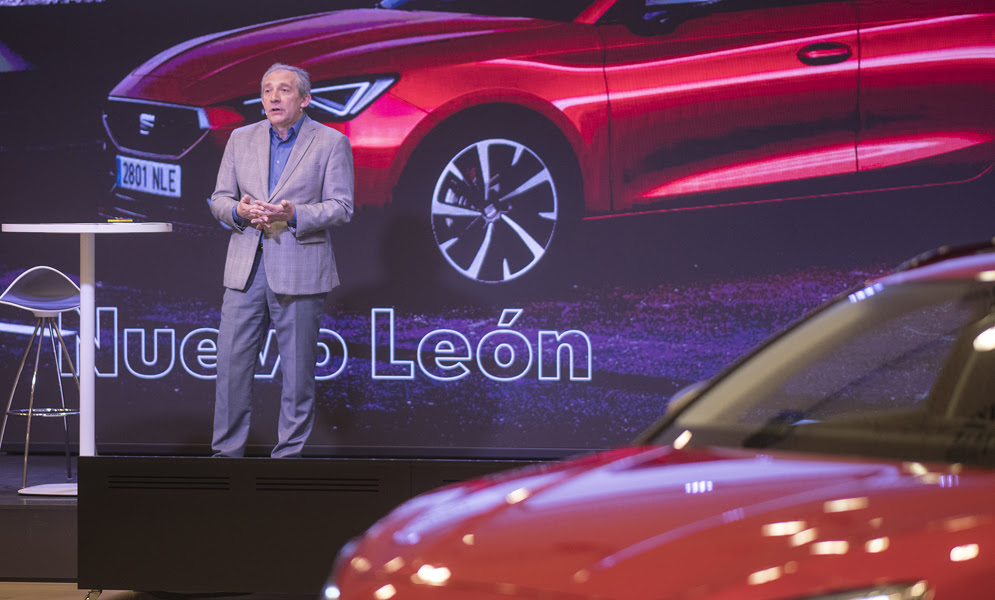SEAT presents its strategy for the future to major suppliers in Spain

- SEAT increases its commitment to component companies located in Spain to reinforce the supply chain and promote sustainability
- The company is exploring the necessary technologies to be installed in Spain for electrification and the connected car
- SEAT introduces the S-Rating tool (Sustainability Rating), to assess and encourage the sustainability and integrity of suppliers
Martorell, 29 July 2020. SEAT gathered 60 of its main suppliers in Spain and associations such as ANFAC (the Spanish Association of Car and Truck Manufacturers), Sernauto (the Spanish Association of Automotive Suppliers) and ACICAE and CIAC (automotive clusters in the Basque Country and Catalonia, respectively) today in a virtual meeting to present its strategy for the future. After announcing an investment plan of 5 billion euros through to 2025 on July 8th, SEAT shared the keys to a strategy that has the transformation of the Spanish automotive industry as one of its main objectives with its supplier network.
The carmaker explained that it will be committed to increasing the level of localisation of components in Spain, which on average represent 60% of the total turnover of the Purchasing area, both for current models and for future projects. With this decision, SEAT aims to shorten the global supply chain in order to reinforce its strength and boost environmental and financial sustainability at the same time. In this sense, SEAT is already working on an analysis plan to determine the current components that could be supplied from Spain in the medium term.
During the meeting, SEAT executive Vice-president for Purchasing Alfonso Sancha stated that “SEAT assumes its leadership and responsibility and aims to strengthen the Spanish industrial sector. To achieve this, we need everyone’s collaboration. Carmakers and suppliers must invest in new technologies to improve competitiveness and adapt to Industry 4.0, electrification and the connected car.”
At the meeting, SEAT set out the details of its vision on the major challenges facing the industry, such as the progressive reduction of the role of the combustion engine, which is forcing manufacturers and suppliers to undergo industrial restructuring, or the entry of new competitors and regions with lower wage costs than Spain, which are intensifying competition in the market.
SEAT’s Vice-president for Purchasing explained that in order to overcome these challenges, they are studying the necessary technologies to be installed in Spain with the aim of making electrification and the connected car a success. “Our industry is at a turning point and it is time to transform. If we don’t do it now, we’ll be too late. We need to become more competitive and modernise the Spanish car industry so that Spain remains a European and global automotive powerhouse” he said.
Sancha also expressed his optimism about the development of the Martorell plant in the coming years, which is in the middle of launching the new SEAT Leon and will see the start of production of the CUPRA Formentor in the coming weeks. “These models are a clear example of SEAT’s strategy for the future and our progress towards electrification and the connected car.”
S-Rating, the barometer of sustainability and integrity
During the meeting SEAT also presented the S-Rating (Sustainability Rating) tool that makes it possible to evaluate and encourage the commitment of its suppliers to sustainability and integrity. With the S-Rating, the company motivates the entire supplier network to make an additional commitment to corporate social responsibility, the environment and sustainability, beyond all legal requirements, and thus contributes to fostering excellence in business practices related with these aspects.
Since the implementation of the tool in mid 2019, any company wishing to collaborate with SEAT, apply for one of its tenders and/or renew or extend an existing contract, must achieve a positive S-Rating qualification. Initially the rating is applied to commercial relations with direct suppliers, although the long-term vision is to reach an optimal level of traceability in terms of sustainability and compliance throughout the supply chain. The S-Rating ensures the procurement of companies that are aligned with the compliance and sustainability standards set by the Volkswagen Group for its business partners.
Of the total volume of supplier awards made by SEAT’s Purchasing department in 2019, 88% obtained a favourable rating, which will be valid for a maximum of six years. The remaining suppliers are given support with the aim of initiating an improvement process that will enable them to reach the required level. Likewise, among all those who obtained the S-Rating certification, 78% of them reached an A Rating, which is the best qualification given by the tool. Among the indicators measured are the responsible use of natural resources, the assurance of a safe and healthy working environment, and the existence of preventive measures to prevent corruption.




